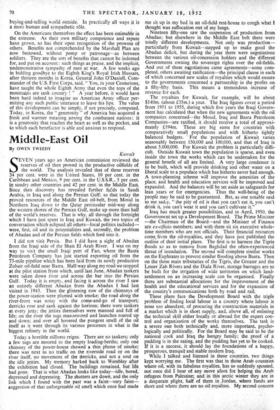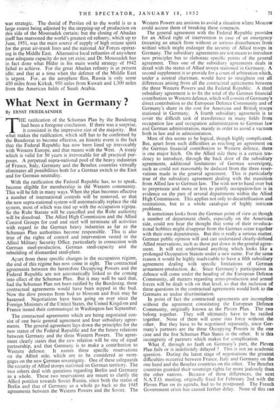Middle-East Oil
By OWEN TWEEDY
Kuwait SEVEN years ago an American commission reviewed the reserves of oil then proved in the productive oilfields of the world. The analysis revealed that of these reserves 34 per cent. were in the United States, 10 per cent. in the Caribbean and Mexico, 9 per cent. in the U.S.S.R., 5 per cent in sundry other countries and 42 per cent. in the Middle East. Since then discovery has revealed further fields in Saudi Arabia, in Iraq and along the Persian Gulf; so that today the proved resources of the Middle East oil-belt, from Mosul in Northern Iraq down to the Qatar peninsular mid-way along the western shores of the Persian Gulf, make up more than half of the world's reserves. That is why; all through the fortnight which I have just spent in Iraq and Kuwait, the two topics of conversation which eclipsed all others—local politics included— were, first, oil and its potentialities and, secondly, the problem of Abadan and of the Persian fields which feed into it.
•
I did not visit Persia. But I did have a sight of Abadan from the Iraqi side of the Shatt El Arab River. I was on my way to visit the small Iraqi port of Fao, where the Basra Petroleum Company has just started exporting oil from the 73-mile pipeline which has been laid from its newly productive Zubair oil-field near Basra. Half-way along my road we stopped at the pilot station from which, until last June, Abadan tankers were taken down river and across the bar into the- Persian Gulf. Today it is empty,_ and facing it across the river I saw an entirely different Abadan from the Abadan I had last visited in 1943. Then the glistening row of the chimneys of the power-station were plumed with smoke; the road. along the river-front was noisy with the come-and-go of transport; derricks rose and sank against the horizon; there were tankers at every jetty; the jetties: themselves were manned and full of life; on the river the tugs manoeuvred and launches roared up and down; and over all hovered the pungent smell of the oil itself as it went through its various processes in what is the biggest refinery in the world.
Today a horrible stillness reigns. There are no tankers; only a few tugs are moored to the empty loading-berths; only one chimney of the power-house showed a thin plume of smoke: there was next to no traffic on the riverside road or on- the river itself, no movement of the derricks, and not a soul on- the idle jetties. My memory harked back to Wembley, after the exhibition had closed. The buildings remained, but life had gone. That is what Abadan looks like today—idle, bored; depressed and depressing. The shutters are down; and the only link which I found with the past was a faint—very, faint— suggestion of that unforgettable oil smelt which once had made me sit up in my bed in. an oil-field rest-house to cough. what I thought was suffocation out of my lungs. Nineteen fifty-one saw the suspension: of production: from Abadan; but elsewhere in the Middle East belt there were totally different developments. Not. only was production— particularly from Kuwait—stepped up to make good the Abadan deficit, but during the year there were negotiations between the various oil-concession holders and the different Governments owning the sovereign rights over the oil-fields.. And out of these negotiations came agreements—some com- pleted, others awaiting ratification—the principal clause in each of which concerned new scales of royalties which would ensure to the governments concerned a partnership in the profits on• a fifty-fifty basis. This means a tremendous increase of revenue for each.
The royalties for Kuwait, for example, will be abOut $140m. (about £35m.) a year. The Iraq figures cover a period! from- 1951 to 1955, during which five years the Praqi Govern- ment has calculated that when the new agreements with the oil companies concerned—the Mosul, Iraq and Basra Petroleum, Companies—are ratified, it should receive a total of approxi- mately £194m. These are big sums for countries with. comparatively small populations and with hitherto tightly balanced budgets. -For the population of Kuwait varies seasonably between 150,000 and 100,000, and that of Iraq -is. about 5,000,000. For Kuwait the problem is particularly diffi- cult. Outside Kuwait town the population is sparse, and even, inside the town the works which can be undertaken for the- general benefit of all are limited. A very large condenser is- to be built, which will provide drinking and other water on- a liberal scale to a populace which has hitherto never had enough.. A town-planning scheme will improve the amenities of the- place, and health and education services will be improved and expanded. And the balances will be set aside as safeguards for lean years or for emergencies. Thus the well-being of the people may be said to be guaranteed. But, as one notable said to me sadiy, " the pity of oil is that you can't eat it; you can't drink it, you can't wear it and you can't cultivate it."
Iraq has much greater possibilities, and in April, 1950, the Government set up a Development Board. The Prime Minister —the Chairman of. the Board—and the Minister of Finance are ex-officio- members; and with-them sit six executive whole- time members who are not officials. Their financial resources come from the oil-royalties, and they have just published the outline of their initial' plans. The first is to harness the Tigris floods so as to remove from- Baghdad the often-experienced threat of inundation. The second- will complete similar works on the Euphrates to prevent similar flooding-above Basra. Then on the three main tributaries of the Tigris, the Greater and the. Lesser Zab Rivers and the Diala River,storage barrages are to be built for the irrigation of wide territories on which land- settlement on an increasing scale can be organised. Finally there are substantial allocations for the improvement of the health and the educational services and for the expansion of the country's communications both- by road and- rail.
These plans face the Development Board with the triple problem of finding local labour in: a country where labour is none- too abundant, of procuring the construction materials in a market which is in short supply, and, above all, of enlisting the, technical skill either locally or abroad for the expert con- trol and organisation of the works themselves. The task is a severe one- both technically and, more important, psycho- logically and politically. For the. Board may be said to be the national cook and Iraq the hungry family; the proof of a pudding is in the eating, and the pudding has yet to be cooked. If- it is a success; it should- lay the: foundations of a happy, prosperous, tranquil and stable modern Iraq. While. I talked. and listened in these countries, two things kept worrying me.. The first was that in llicise Arab countries. where- oil, with its: fabulous royalties, has so suddenly spouted, not: once did. T hear of any move afoot for helping- the Arab refugees. front Palestine; and in: this arctic winter they are in a• desperate plight, half of them in Jordan, where funds are short and where there are: no oil! royalties. My second concern was strategic. The denial of Persian oil to the world is to a large extent being adjusted by the_stepping-up of production on this side of the Moussadek curtain; but the closing of Abadan itself has marooned the world's greatest oil refinery, which up to June, 1951, was the main source of supply of high octane spirit for the great air-trunk lines and the national Air Forces operat- ing in the Middle East. Alternative local refineries of anywhere near adequate capacity do not yet exist; and Dr. Moussadek has in fact done what Hitler in his main world strategy of 1942 failed to achieve. For the great Abadan refinery is at present idle; and that at a time when the defence of the Middle East is urgent. For, as the aeroplane flies, Russia is only some 450 miles from Kirkuk, 950 miles from Kuwait and 1,300 miles from the American fields of Saudi Arabia.



































 Previous page
Previous page